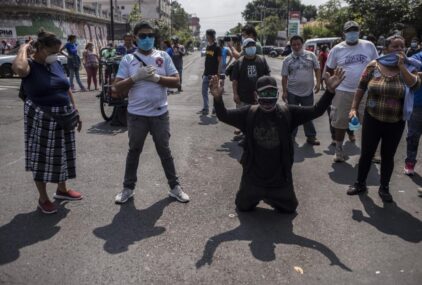Anti-racism and anti-fascism protests: news and analysis
English Black Lives Matter The Souls of White Folk – Verso Books Illiberal Racisms, Extremism and the Discursive Reconstruction of the Far Right – Verso
Science, political crisis and the lives of people
By Lorena Moraes* Last weekend, the largest Brazilian national survey on Covid-19 suffered resistance in a number of cities, most of them located in the
Bolsonaro’s most radical supporters only believe what he tells them
As Brazil has been rising the tops of global coronavirus dissemination curve and Bolsonaro’s popularity hits a new low, his most radical support base has
Contradictory contestations: anti-lockdown protests
English Germany Politicians worry about radicalization at anti-lockdown protests – Deutsche Welle US Tea Party 2.0: What the Reopen Protest have in common with the
Sexual politics in times of pandemic
March and early April 2020 It has been very challenging to prepare the SPW announcement for March/April 2020 due to the abnormality, risks, and losses

COVID-19 and surveillance: English, Portuguese and Spanish
English Securing Data and Labor Rights in the Post-Covid Digital Era – Bot Populi Big Tech Is Using the Pandemic to Push Dangerous New Forms
COVID-19 and Biopolitics: Compilation I (March-June 2020)
The Agamben Debates Giorgio Agamben: Contagion – Enough 14 Philosophy and Pandemic in the Postdigital Era: Foucault, Agamben, Žižek – Post Digital Science and Education
Bukele: A ‘caudilho’ Dies and A Messiah is Born in El Salvador
SPW begins a series of brief analyses of the Covid-19 crisis in contexts that are generally under-reported by the mainstream press and which are characterized

India and coronavirus: news and analysis (March – June)
Delhi Progrom Victims Getting No Treatment Due to COVID-19 – National Herald FIR against Scroll’s Supriya Sharma for story on Varanasi woman’s lockdown ‘misery’ –

Hungary and coronavirus: authoritarianism (April and May update)
Hungary Hungary rolls back legal protections, puts trans and intersex people at risk – Ilga Europe Hungary votes to end legal recognition of trans people




